牛顿简介英文版
牛顿的英文作文介绍

牛顿的英文作文介绍英文:Newton was one of the most influential scientists in history. He was born in 1642 in England and is best knownfor his laws of motion and his work on gravity. His laws of motion describe how objects move and interact with each other, while his work on gravity explains why objects are attracted to each other.One of the most famous stories about Newton is the one about the apple falling on his head. According to the story, Newton was sitting under an apple tree when an apple fellon his head. This event led him to wonder why the applefell straight down instead of sideways or up. This led himto develop his theory of gravity.Another important contribution that Newton made to science was his work on light. He discovered that whitelight is made up of different colors and that each colorhas a different wavelength. This led to the development of the first color wheel.In addition to his scientific work, Newton was also a mathematician. He developed calculus, which is a branch of mathematics that deals with rates of change and slopes of curves. Calculus is used in many fields today, including physics, engineering, and economics.Overall, Newton's contributions to science and mathematics have had a profound impact on our understanding of the world around us. His ideas and discoveries continueto influence scientists and researchers today.中文:牛顿是历史上最具影响力的科学家之一。
介绍牛顿的英文作文简单
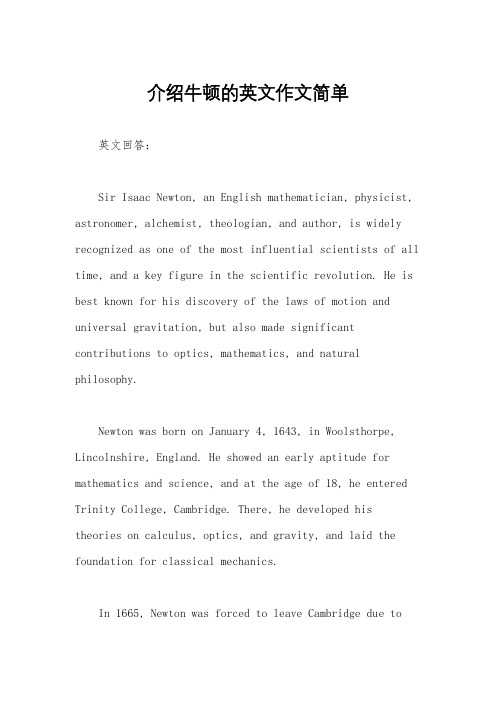
介绍牛顿的英文作文简单英文回答:Sir Isaac Newton, an English mathematician, physicist, astronomer, alchemist, theologian, and author, is widely recognized as one of the most influential scientists of all time, and a key figure in the scientific revolution. He is best known for his discovery of the laws of motion and universal gravitation, but also made significant contributions to optics, mathematics, and natural philosophy.Newton was born on January 4, 1643, in Woolsthorpe, Lincolnshire, England. He showed an early aptitude for mathematics and science, and at the age of 18, he entered Trinity College, Cambridge. There, he developed his theories on calculus, optics, and gravity, and laid the foundation for classical mechanics.In 1665, Newton was forced to leave Cambridge due tothe Great Plague of London. During this period of isolation, he made some of his most important scientific discoveries, including the three laws of motion and the law of universal gravitation.Newton's laws of motion describe the relationship between an object's mass, velocity, and acceleration. The first law states that an object at rest will remain at rest, and an object in motion will remain in motion at a constant velocity, unless acted upon by an external force. The second law states that the acceleration of an object is directly proportional to the net force acting on it, and inversely proportional to its mass. The third law statesthat for every action, there is an equal and opposite reaction.Newton's law of universal gravitation states that every particle of matter in the universe attracts every other particle with a force that is directly proportional to the product of their masses and inversely proportional to the square of the distance between them. This law explains the motion of planets around the sun, the tides on Earth, andthe formation of galaxies.Newton's discoveries had a profound impact on the development of science and technology. His laws of motion and universal gravitation provided the foundation for classical mechanics, and his work on optics laid the groundwork for modern optics. His contributions to mathematics, including the development of calculus, were also groundbreaking.Newton was a prolific writer, and his most famous work, Principia Mathematica, published in 1687, is considered one of the most important scientific works ever written. Inthis work, he presented his laws of motion and universal gravitation, as well as his theories on calculus and other mathematical concepts.Newton died on March 20, 1727, in London, England. He was buried in Westminster Abbey, where he is commemorated with a grand monument. His work continues to inspire scientists and engineers to this day, and his legacy as one of the greatest scientists of all time is secure.中文回答:艾萨克·牛顿爵士,一位英国数学家、物理学家、天文学家、炼金术士、神学家和作家,被广泛认为是有史以来最有影响力的科学家之一,也是科学革命中的关键人物。
介绍牛顿的一生英语作文
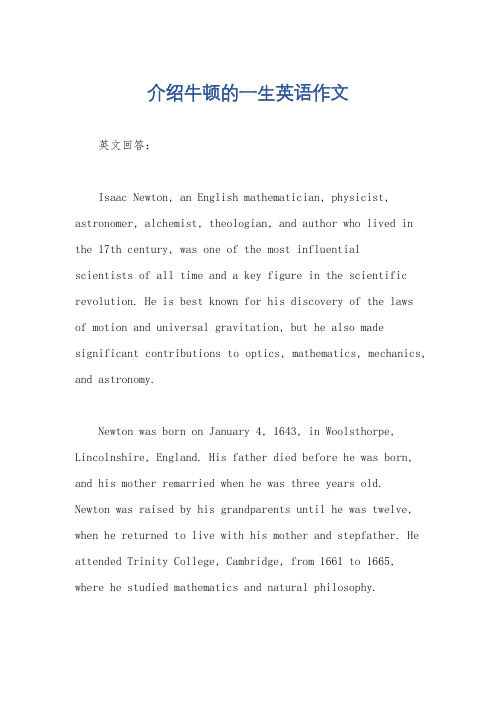
介绍牛顿的一生英语作文英文回答:Isaac Newton, an English mathematician, physicist, astronomer, alchemist, theologian, and author who lived in the 17th century, was one of the most influentialscientists of all time and a key figure in the scientific revolution. He is best known for his discovery of the lawsof motion and universal gravitation, but he also made significant contributions to optics, mathematics, mechanics, and astronomy.Newton was born on January 4, 1643, in Woolsthorpe, Lincolnshire, England. His father died before he was born, and his mother remarried when he was three years old. Newton was raised by his grandparents until he was twelve, when he returned to live with his mother and stepfather. He attended Trinity College, Cambridge, from 1661 to 1665, where he studied mathematics and natural philosophy.In 1665, the Great Plague of London forced Newton to return home to Woolsthorpe. During this time, he developed his theory of calculus, which he called "the method of fluxions." He also made significant progress on his theory of universal gravitation, which he published in his Principia Mathematica in 1687.In 1669, Newton was appointed Lucasian Professor of Mathematics at Cambridge. He held this position until 1701, when he was appointed Master of the Royal Mint. He served in this role until his death in 1727.Newton was a prolific writer, and his works include the Principia Mathematica, the Opticks, and the Method of Fluxions. He was also a devout Christian, and he wrote extensively on religious topics.Newton died on March 20, 1727, in London. He was buried in Westminster Abbey.中文回答:艾萨克·牛顿,是一位生活在17世纪的英国数学家、物理学家、天文学家、炼金术士、神学家和作家,他是当时最具影响力的科学家之一,也是科学革命的关键人物。
牛顿简介【英文】

By: Perri Tucker
Who is Sir Isaac Newton??
Isaac Newton was born on December 25,1642. He was an English mathematician and Physicist who invented calculus In 1665 he found the answer to the binomial theorem, that mathematicians had struggled to solve for years. Newton identified the force as gravity and determined its mathematical nature.
Newton’s Law of Gravitation Equation
F=Gm1m2/r2
Newton’s Three Laws of Motion
1) An object at rest stays at rest, and an object in uniform motion remains in that state of motion unless an external force is applied to it. (Law of Inertia)
Newton’s Three Laws of Motion
2) A force causes acceleration of an object. (F=ma)
Newton’s Three Laws of Motion
3) For every action there is an equal and opposite reaction.
_近代科学之父牛顿英语介绍
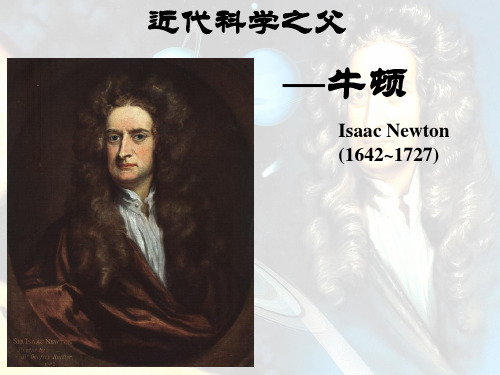
.
.
•
2 Newton almost became a farmer . Newton was born in a farming family. When he was 17 years old, her mother insisted on Newton comes home from school to do farm work. Thank goodness, Newton was not good at farm work. Not a
牛顿在中学时代学习成绩并不出众,但对自然现象有好奇心,尤其是几何学、哥白尼的日心说 等等。他还分门别类的记读书笔记,喜欢做些小试验。
Later ,his mother asked Newton to leave school and work on their farm to support their family. But Newton would devote himself whenever possible. When his mother told him to learn the work of business, he hided in the bushes in order to read a book. On one occasion, his uncle found that his nephew lying on the grass, concentrating on study of a mathematical problem. his uncle was moved, then he persuaded Newton’s mother to let Newton return school, and encourages Newton to go to university. Newton returned to school to study again
牛顿的简介作文英文

牛顿的简介作文英文Isaac Newton was a famous scientist and mathematician. He was born in 1642 in England and is best known for his work on the laws of motion and universal gravitation. Newton's work laid the foundation for classical mechanics and his book "Philosophiæ Naturalis Principia Mathematica" is one of the most influential books in the history of science.Newton made several important discoveries during his lifetime. He developed the three laws of motion, which describe the relationship between a body and the forces acting on it. He also formulated the law of universal gravitation, which states that every particle of matter in the universe attracts every other particle with a forcethat is directly proportional to the product of their masses and inversely proportional to the square of the distance between their centers.In addition to his work in physics, Newton also madesignificant contributions to mathematics. He is creditedwith the development of calculus, along with German mathematician Gottfried Wilhelm Leibniz. Newton's work in mathematics and physics revolutionized the way weunderstand the natural world and laid the groundwork for many future scientific discoveries.Newton's impact on the scientific community was immense, and his work continues to influence scientists and mathematicians to this day. He was knighted by Queen Annein 1705 and spent the later years of his life as the president of the Royal Society, where he continued to make important contributions to scientific research and scholarship.Newton's legacy is one of innovation and discovery. His work in physics and mathematics has had a lasting impact on the way we understand the natural world, and his ideas continue to be studied and celebrated by scientists and scholars around the world. Isaac Newton will always be remembered as one of the greatest scientific minds in history.。
Newton_牛顿_英文介绍
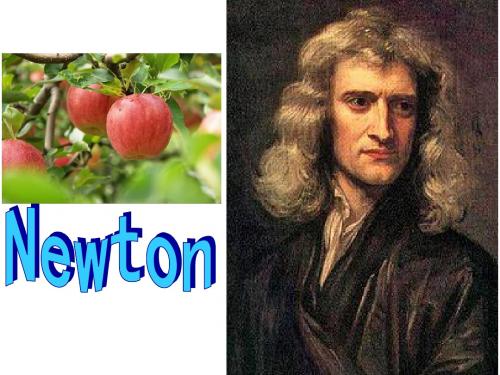
The legend is that Newton saw an apple fall in his garden in Lincolnshire, thought of it in terms of an attractive gravitational force towards the earth, and realized the same force might extend as far as the moon.
And so on .
1、the discovery of gravitational theory and classic mechanics
Let us now turn to the central topic f the Principia, the universality of the gravitational force.
The main experiences of newton
he entered Cambridge University in 1661;
he was elected a Fellow of Trinity College in 1667, and got the Master's Degree the next year.
The main contributions of Newton
1、The invention of calculus
2、the discovery of gravitational theory and classic mechanics
3、Optics ①、the designer an the inventor of the first type of catoptric telescope ②、discovered the princinple of optical dispersion
牛顿介绍英语作文

牛顿介绍英语作文英文回答:As a famous physicist and mathematician, Sir Isaac Newton is best known for his contributions to the laws of motion and universal gravitation. Born in 1643 in England, Newton made groundbreaking discoveries in the field of physics and mathematics that have had a lasting impact on the scientific community.One of Newton's most famous contributions is his three laws of motion. These laws describe the relationship between the motion of an object and the forces acting on it. For example, Newton's first law states that an object atrest will remain at rest, and an object in motion will remain in motion unless acted upon by an external force. This can be seen in everyday life when a ball continues to roll until it is stopped by a force, such as friction or a person's hand.In addition to his laws of motion, Newton also developed the law of universal gravitation, which explains the force of attraction between two objects with mass. This law is often summarized by the equation F = G (m1 m2) / r^2, where F is the force of attraction, G is the gravitational constant, m1 and m2 are the masses of the two objects, and r is the distance between them. This law has been essential in understanding the motion of celestial bodies, such as planets and stars.Newton's work laid the foundation for classical mechanics and had a profound impact on the scientific revolution. His discoveries have been instrumental in shaping our understanding of the natural world and continue to be studied and applied in various fields of science and engineering.中文回答:作为一位著名的物理学家和数学家,艾萨克·牛顿爵士以他对运动定律和万有引力的贡献而闻名。
介绍牛顿的英语作文
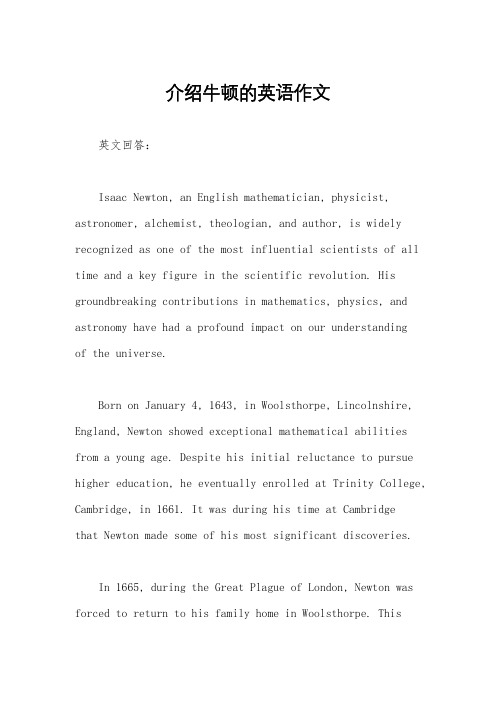
介绍牛顿的英语作文英文回答:Isaac Newton, an English mathematician, physicist, astronomer, alchemist, theologian, and author, is widely recognized as one of the most influential scientists of all time and a key figure in the scientific revolution. His groundbreaking contributions in mathematics, physics, and astronomy have had a profound impact on our understandingof the universe.Born on January 4, 1643, in Woolsthorpe, Lincolnshire, England, Newton showed exceptional mathematical abilities from a young age. Despite his initial reluctance to pursue higher education, he eventually enrolled at Trinity College, Cambridge, in 1661. It was during his time at Cambridgethat Newton made some of his most significant discoveries.In 1665, during the Great Plague of London, Newton was forced to return to his family home in Woolsthorpe. Thisperiod of isolation proved to be highly productive for Newton, and it was during this time that he developed his fundamental laws of motion and universal gravitation. These groundbreaking theories laid the foundation for classical mechanics and celestial mechanics, and they continue to be essential components of modern physics.After returning to Cambridge in 1667, Newton published his seminal work "Philosophiæ Naturalis Principia Mathematica" (Mathematical Principles of Natural Philosophy) in 1687. This masterpiece presented his three laws ofmotion and his law of universal gravitation, whichexplained the motion of celestial bodies and provided a unified framework for understanding the physical world.Newton's contributions to mathematics were equally significant. He developed the calculus, a powerful mathematical tool that revolutionized the fields of mathematics and physics. He also made importantcontributions to the study of optics, including his discovery of the composition of white light and the development of the reflecting telescope.Besides his scientific achievements, Newton was also deeply interested in theology and alchemy. He wrote extensively on biblical interpretation and the existence of God. Newton's religious beliefs influenced his scientific work, and he saw his discoveries as evidence of the harmony and order of the universe.Throughout his life, Newton received numerous honors and accolades for his scientific contributions. He was knighted by Queen Anne in 1705 and served as President of the Royal Society from 1703 to 1727.Isaac Newton's legacy is immense. His groundbreaking discoveries in mathematics, physics, and astronomy laid the foundation for modern science, and his ideas continue to inspire and challenge scientists to this day. His name remains synonymous with scientific genius and his contributions to the advancement of human knowledge are immeasurable.中文回答:牛顿简介。
牛顿主要介绍英语作文

牛顿主要介绍英语作文Isaac Newton, a towering figure in the scientific world, was born in 1642 in Woolsthorpe, England. His contributionsto physics, mathematics, and astronomy are unparalleled, with the laws of motion and universal gravitation being his most famous works.Newton's intellectual journey began at the University of Cambridge, where he delved into the mysteries of the universe. His curiosity and relentless pursuit of knowledge led him to formulate the three laws of motion, which laid the foundation for classical mechanics.In the realm of optics, Newton challenged the prevailing theories with his own experiments, demonstrating that white light is composed of a spectrum of colors. This discovery revolutionized the understanding of light and color.His seminal work, "Philosophiæ Naturalis Principia Mathematica," published in 1687, is considered one of themost important scientific works ever written. It outlined the mathematical principles of the universe, influencing generations of scientists.Newton's life was not confined to academia. He served as the Master of the Mint and was a member of Parliament, showcasing his diverse talents beyond the scientific community.Despite his monumental achievements, Newton was a humble man who once said, "If I have seen further, it is by standing on the shoulders of giants." His legacy continues to inspire, reminding us of the power of curiosity and the pursuit of truth.。
牛顿身世介绍英文作文简短
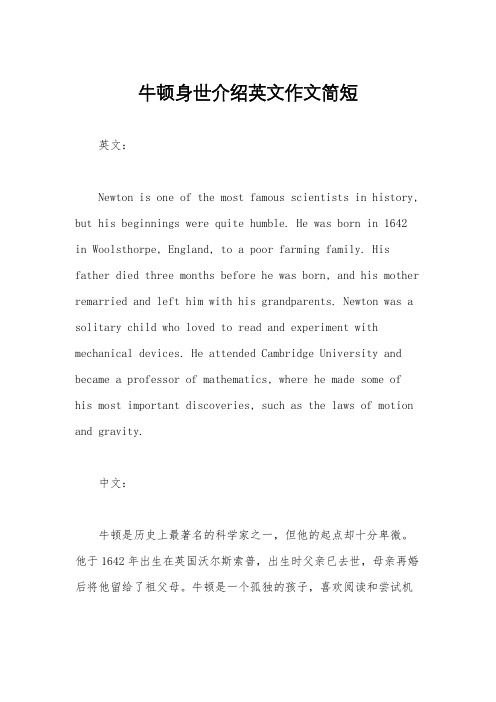
牛顿身世介绍英文作文简短
英文:
Newton is one of the most famous scientists in history, but his beginnings were quite humble. He was born in 1642
in Woolsthorpe, England, to a poor farming family. His father died three months before he was born, and his mother remarried and left him with his grandparents. Newton was a solitary child who loved to read and experiment with mechanical devices. He attended Cambridge University and became a professor of mathematics, where he made some of his most important discoveries, such as the laws of motion and gravity.
中文:
牛顿是历史上最著名的科学家之一,但他的起点却十分卑微。
他于1642年出生在英国沃尔斯索普,出生时父亲已去世,母亲再婚后将他留给了祖父母。
牛顿是一个孤独的孩子,喜欢阅读和尝试机
械装置的实验。
他就读于剑桥大学,并成为了一名数学教授,在那里他做出了一些他最重要的发现,如运动和重力定律。
- 1、下载文档前请自行甄别文档内容的完整性,平台不提供额外的编辑、内容补充、找答案等附加服务。
- 2、"仅部分预览"的文档,不可在线预览部分如存在完整性等问题,可反馈申请退款(可完整预览的文档不适用该条件!)。
- 3、如文档侵犯您的权益,请联系客服反馈,我们会尽快为您处理(人工客服工作时间:9:00-18:30)。
Isaac Newton
On December 25, 1642, Newton was born in Ulsthorpe, a small village in England. Newton lost his father at an early age and was dependent on his mother. He entered trinity college, Cambridge, in 1661.
Between 1665 and 1667, Newton was already thinking about gravity. One evening, he was sitting under the apple tree, enjoying the cold. An apple fell from the tree. It occurred to him: why did the apple fall only to the ground and not to the sky? He analyzed Copernicus's heliocentric theory and Kepler's three laws, and then thought: why do the planets keep moving around the sun? Why are planets so fast when they are close to the sun and so slow when they are far away? Why are planets orbiting farther away from the sun longer? Newton found The Law Of Attraction.
Isaac Newton, the great British physicists, mathematicians, scientists, thinkers and philosophers, and at the same time he was also an enthusiast of Britain alchemy. He proposed the law of gravity in the Philosophiae Naturalis Principia Mathematica published on July 5, 1687. Newton's law of motion forms the foundation of classical mechanics, and he imagined space and time as some invisible matrix through which we pass without changing them. Newton and leibniz independently invented calculus. In mechanics, Newton explained the principle of conservation of momentum and angular momentum. In optics, he invented the reflection telescope and developed the color theory based on the observation that white light is emitted by a prism into a visible spectrum. He also formulated the cooling laws and studied the speed of sound. He left over half a million words of alchemy and more than a million words of his works. He is recognized as one of the greatest and most influential scientists in human history.。
